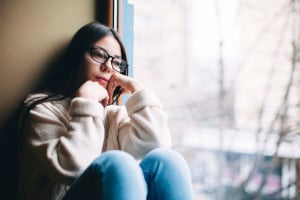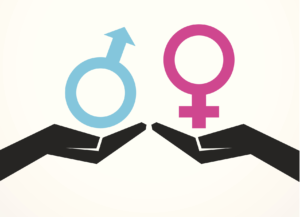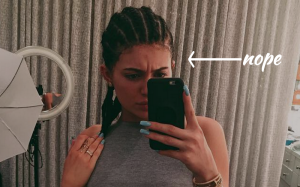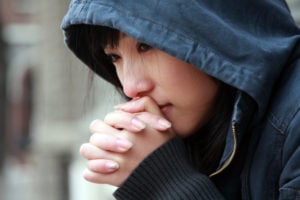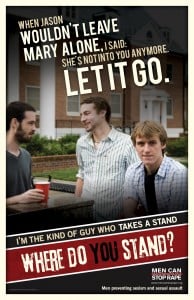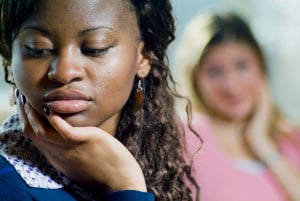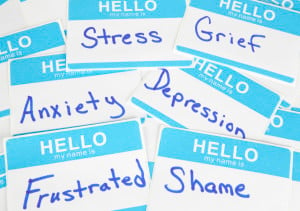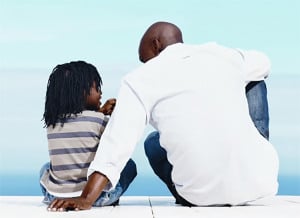Originally published on Some Talk of You and Me and republished here with the author’s permission.
People make allowances for all sorts of grief.
Compassion is often our first and most natural response when it comes to bereavement and loss, especially loss we can give a name to.
Something discernible that from the outside is easy to understand. Easy to put into words.
Infertility is often a loss of staggering proportions.
To those of us who experience it, it can be incomprehensible. Bewildering. Mind-numbing.
Yet it is not an easy loss to define. Nobody died. There is no funeral to attend. No one sends flowers or sympathy cards.
Even to the ones who suffer this loss, it can be a struggle to find the proper words to describe it.
What have we really lost? What words can we use to do justice to this thing that knocks the air from our lungs?
It isn’t loss that has a name or memories or a number of years attached to it.
We are mourning something intangible — what never was and what never will be. Because of this, it can also be difficult for others to grasp.
While most people would agree it is sad to not be able to have children, the idea of feeling desperation and wild crippling grief could seem dramatic, excessive and even weak.
I came to think that the most common response to infertility was: “At least it isn’t… “
From well-meaning souls I heard that at least I didn’t have cancer. At least I hadn’t had a miscarriage or three. At least I hadn’t lost a sibling or a parent or even my job. At least I wasn’t dying.
To be fair, these “at leasts” weren’t meant to be hurtful but they did breathe distance into some of our relationships. A part of me understood that these phrases were meant to reassure me, that these people genuinely wanted to help me to put what I felt in perspective, but at that early point in my journey I was still reeling from the pain and shock of it.
It wasn’t perspective I sought, (that came later), it was understanding.
I needed someone to sit down and hold my hand and say, “I’m so sorry, this must hurt so much. I’m here for you.”
There were some who did exactly this, who it was safe to grieve with. They spoke with love and compassion and the very fact that they allowed my grief to exist and they heard me was healing.
Unfortunately, more often, the unintentional message I heard was that of my sadness being undermined, made less by the words “at least.”
How could my personal pain possibly measure up against all the greater tragedies in the world?
So I would sit there, my eyes cast down. Twisting my fingers together. Nodding my head apologetically because how could I disagree with such logic?
Yes, at least I wasn’t dying.
Except I was.
I would catch myself feeling as though I should apologize for all my sadness and anger, for daring to be so bold as to let my heart shatter and my world fall apart over this. Apologize for all this hurt my heart couldn’t contain.
I would bite back all the words I wanted to say. The hurt and desperation I thought I might be able to share with someone. I recall feeling complete dismay that others couldn’t see how this loss to me felt like grieving an actual death.
I didn’t have a child I was mourning, but in my heart, I was mourning every child.
I cried rivers over the little boys and little girls who would never have my smile or my husband’s eyes. I began to have dreams of stumbling down a difficult forest path leading to a pitch black lake where a child was floating face down in the water.
The grief I experienced in this dream echoed my grief in real life—indescribable and haunting.
I hurt endlessly, and on top of all this, I felt like the worst sort of failure because I wasn’t able to just slap a smile on my face and convince myself that at least it wasn’t worse.
For myself, at the time, and others in the process of going through this, it is the worst. It just is.
There is nothing trivial about grief over infertility. A person can grieve the loss of their dream of a biological family as honestly and deeply as someone else can grieve the loss of a child or parent or partner or their health.
There is no “at least” when it comes to the breaking of the human heart, there is no need to try to measure one person’s pain against another to see who is worthy of feeling grief and who isn’t.
If you are in a similar situation, you probably know already that no grief ever fully disappears, but I want to tell you from eight years down the road from this pain, that one day these wounds that now feel so raw and open will heal. They will still pulse with pain every so often but you will be restored to yourself and left with the truth of who you are.
The truth is things will change and you will change. It won’t always hurt the way it does now. I promise you that you will find your way.
I’m going to leave you with one “at least” that I hope makes a difference.
That in this pain that feels so solitary, at least you’re not alone.
[do_widget id=’text-101′]
Colleen Berge is from the vast prairies of Manitoba, Canada. After short stints living in Germany and Iceland, she now resides in Southern Norway with her Norwegian husband. They have two small sons, one from Sri Lanka and one from Chile. An idealist, dreamer, writer, traveler, life-long learner and lover of life, it’s fair to say there are pieces of everywhere tucked away safely in this writer’s heart. She loves creative writing but also is passionate about writing that promotes empathy and encourages engagement in the issues we all face and can relate to. Follow Colleen on Twitter @colleen_berge.
Search our 3000+ articles!
Read our articles about:
Our online racial justice training
Used by hundreds of universities, non-profits, and businesses.
Click to learn more


